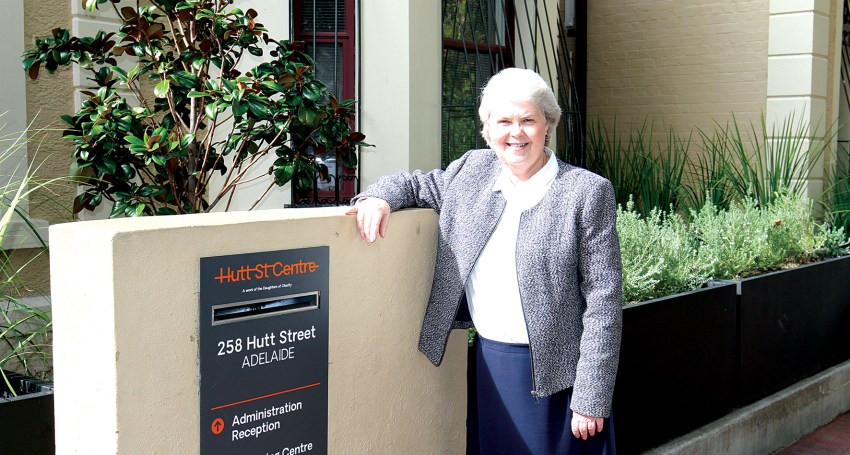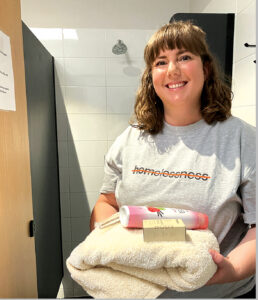Increased demand for frontline services
News
The rental and housing crisis, cost of living pressures and post-COVID health issues are contributing to a sharp rise in the number of people seeking support from the Hutt St Centre.

The Centre has reported a 27 per cent increase in client visits over the past year, with more than 6000 visits in the January-February period alone. On April 18, the Centre reported its busiest day on record, with 175 people walking through the doors and 154 meals served.
Requests for material aid such as clothing and toiletries have increased by 111 per cent.
The alarming figures support the recently-released homelessness data from the 2021 Australian Census which revealed a 20 per cent rise in the number of people experiencing homelessness in South Australia, from 6224 people in 2016 to 7428 in 2021.
Advertisement
Hutt St Centre Board member Sister Debra McCarthy DC said the statistics reflected “where society is at” and voiced her concern for those experiencing homelessness as the cold winter weather approaches.
“Increasingly, we are seeing a whole new group of people who we wouldn’t have considered all that disadvantaged, who are now. People who have had jobs or have jobs, who are still really struggling,” the Melbourne-based Sister told The Southern Cross during a visit to Adelaide.
“There is the rental crisis – rents are rocketing and they can’t get another place. You hear stories of people having to make the decision, is it antibiotics for my child or is it food? And there are the people who can’t pay their mortgages any more, they are trying to sell their home but then where do they go?
“It just rolls on and that puts pressures on families in terms of relationships, which can increase to incidences of separation and even domestic violence.”
Sr Debra said the increasing demand for Hutt St Centre services also highlighted a post-COVID element, as people had neglected their physical and mental health during the pandemic.
“Health issues that were maybe minor in 2020 are now pretty major,” she said.
“If you are someone who has already been struggling with life, you have some mental health issues or addictive behaviours, now all of this is just layer upon layer and sometimes it ends with people having to sleep rough, or in awful housing situations or couch surfing, which leads them to come to a place like Hutt St Centre.
“They know that here the basics of life can be met and they can get some help to get out of this situation.”
Joining the Daughters of Charity in 1982 after working as a speech pathologist, the Queensland-born Sister said she had been drawn to the congregation because of its spirit to work with the ‘poorest of the poor’.

Advocacy team leader Kara Smith gathering items for clients.
She believed that the Sisters, who founded the Centre in 1954, would be “thrilled” to see the facilities now available, including the Wellbeing Centre which opened in 2021. From humble beginnings when the Sisters would serve 50 sandwiches and jars of tea to those in need, the Centre now offers a warm meal, a hot shower, fresh clothes and access to more than 20 visiting and pathways services that are essential to surviving homelessness.
Related Story
A simple hello
Sr Debra said the “three-tier approach” take by Hutt St Centre – of meeting immediate needs; short term case management; and then providing three years of intensive case management through the Aspire program, enabled people to embark on a journey to a better life.
“Not only are we seeing increasing numbers but also increasing complexity of issues,” she explained.
“It’s a double-edged sword and you need those medium and long term processes to assist them. There are no quick fixes here.
“The other thing Hutt St Centre does well is its advocacy programs.
“People think it is just fundraising but it is also about trying to reframe society’s perceptions of people. That awareness raising and personalising the stories of clients are important as these are people, they are not statistics, they are not invisible people.”
Sr Debra reinforced the need for Catholics to recognise that the people they are walking past in the street are “real human beings” and the people who “Jesus reached out to and he really loved”.
“You may not be able to give money or go and buy them a coffee or sandwich, but you can at least go and say hello and acknowledge their humanity, you can make eye contact with them…everyone can do that.
“We need to recognise it is not an ‘us’ and ‘them’ society. We are one. That’s the really important message here.”







